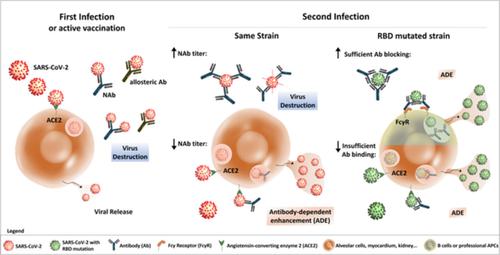当前位置:
X-MOL 学术
›
Cytom. Part A
›
论文详情
Our official English website, www.x-mol.net, welcomes your feedback! (Note: you will need to create a separate account there.)
Dengue Fever, COVID-19 (SARS-CoV-2), and Antibody-Dependent Enhancement (ADE): A Perspective.
Cytometry Part A ( IF 3.7 ) Pub Date : 2020-06-07 , DOI: 10.1002/cyto.a.24047 Henning Ulrich 1 , Micheli M Pillat 2 , Attila Tárnok 3, 4, 5
Cytometry Part A ( IF 3.7 ) Pub Date : 2020-06-07 , DOI: 10.1002/cyto.a.24047 Henning Ulrich 1 , Micheli M Pillat 2 , Attila Tárnok 3, 4, 5
Affiliation

|
SARS‐CoV‐2 pandemic and recurrent dengue epidemics in tropical countries have turned into a global health threat. While both virus‐caused infections may only reveal light symptoms, they can also cause severe diseases. Here, we review the possible antibody‐dependent enhancement (ADE) occurrence, known for dengue infections, when there is a second infection with a different virus strain. Consequently, preexisting antibodies do not neutralize infection, but enhance it, possibly by triggering Fcγ receptor‐mediated virus uptake. No clinical data exist indicating such mechanism for SARS‐CoV‐2, but previous coronavirus infections or infection of SARS‐CoV‐2 convalescent with different SARS‐CoV‐2 strains could promote ADE, as experimentally shown for antibodies against the MERS‐CoV or SARS‐CoV spike S protein. © 2020 International Society for Advancement of Cytometry
中文翻译:

登革热、COVID-19 (SARS-CoV-2) 和抗体依赖性增强 (ADE):观点。
热带国家的 SARS-CoV-2 大流行和登革热反复流行已成为全球健康威胁。虽然这两种病毒引起的感染可能只表现出轻微的症状,但它们也可能导致严重的疾病。在这里,我们回顾了在第二次感染不同病毒株时可能发生的以登革热感染而闻名的抗体依赖性增强 (ADE)。因此,预先存在的抗体不会中和感染,而是增强感染,可能是通过触发 Fcγ 受体介导的病毒摄取。没有临床数据表明 SARS-CoV-2 存在这种机制,但先前的冠状病毒感染或 SARS-CoV-2 康复者感染不同的 SARS-CoV-2 毒株可以促进 ADE,如针对 MERS-CoV 的抗体或SARS-CoV 刺突 S 蛋白。
更新日期:2020-07-22
中文翻译:

登革热、COVID-19 (SARS-CoV-2) 和抗体依赖性增强 (ADE):观点。
热带国家的 SARS-CoV-2 大流行和登革热反复流行已成为全球健康威胁。虽然这两种病毒引起的感染可能只表现出轻微的症状,但它们也可能导致严重的疾病。在这里,我们回顾了在第二次感染不同病毒株时可能发生的以登革热感染而闻名的抗体依赖性增强 (ADE)。因此,预先存在的抗体不会中和感染,而是增强感染,可能是通过触发 Fcγ 受体介导的病毒摄取。没有临床数据表明 SARS-CoV-2 存在这种机制,但先前的冠状病毒感染或 SARS-CoV-2 康复者感染不同的 SARS-CoV-2 毒株可以促进 ADE,如针对 MERS-CoV 的抗体或SARS-CoV 刺突 S 蛋白。


























 京公网安备 11010802027423号
京公网安备 11010802027423号